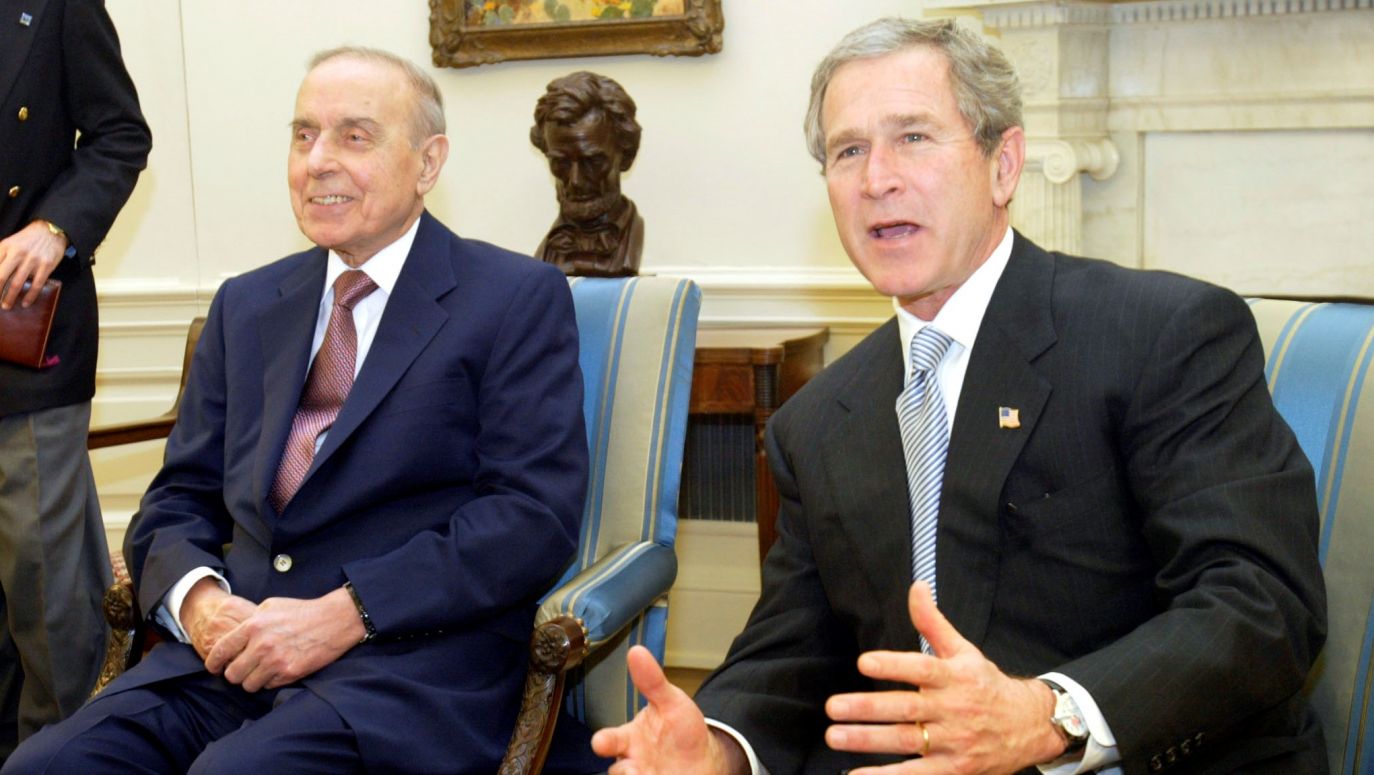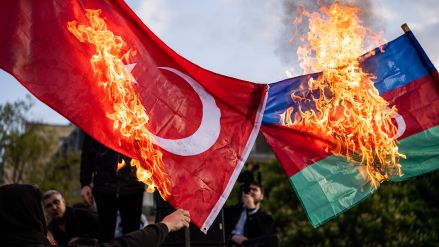In 1992, parts of Azerbaijan came under Armenian occupation, and no one reacted to this injustice. So later, a similar scenario unfolded in Georgia, in Abkhazia and South Ossetia, as well as in Moldova, in Transnistria. Today, we have a full-scale war in Ukraine. It is a classic domino effect. If you don’t react in one place, this inaction leads to similar situations emerging elsewhere.
But let me say one thing. Today, we finally have an open prospect of ending this long-standing conflict. The Armenian Prime Minister says he is ready to recognise Azerbaijan’s territory, including Karabakh.
We need to see how much such declarations are worth in reality. Here is a new map, showing Karabakh [Elchin Amirbayov shows a map – ed.]. The areas marked in yellow are still not under Azerbaijan’s control, and there are still 10,000 regular Armenian military units in those areas. If their Prime Minister is serious and if Armenia respects our territorial integrity, they must withdraw their forces from those territories, as Nikol Pashinyan pledged to do in 2020.
Pashinyan is one of the first leaders in Armenia who wants peace. However, the Armenian public, especially the wealthy and influential diaspora, is not willing to admit defeat. So perhaps an agreement should be arranged in a way that allows both sides to save face and announce success in their own territories?
Who represents public opinion in Armenia? Because if we talk about the nation, democratic elections, and voters who determined Armenia’s future by choosing Pashinyan, they still strongly support not only him but also his policies. They support his efforts to curb hostility towards Azerbaijan and Turkey. The so-called Karabakh issue is no longer at the top of the priority list for his voters. If it were different, Pashinyan would not have won the elections. For Armenians, it is more important for Armenia to become a good country to live in, with a developed economy and a predictable future. Above all, it should be a country that is much less dependent on its current patrons.
It seems to me that the declarations made to Pashinyan and the agreement by Azerbaijan leaders do not help. For example, on 18 April 2023, in an interview with the state television AzTV, President Ilham Aliyev stated: “Armenians living in Karabakh must either accept Azerbaijani citizenship or find another place to live.”
One should not take those words out of context. Their meaning is as follows: the residents of Karabakh, which is an integral part of Azerbaijan, have a real choice. They can stay and live in Azerbaijan, abandon futile fantasies, accept our constitution, the principles of coexistence, and our citizenship.
And if they do not want to do that, they can choose to leave our country. That’s all there is to it. We would like those who choose to stay to enjoy full rights, including employment opportunities, education, healthcare, and more. But it must be done in strict accordance with the fundamental rights of Azerbaijan.
 SIGN UP TO OUR PAGE
SIGN UP TO OUR PAGE 
We differ from Armenia, which is rather a monoethnic country. In Azerbaijan, representatives of over 50 ethnic groups live in harmony, like one family, and abide by our common law. We have one constitution and do not discriminate against anyone based on their ethnic origin, religion, or language.
If Armenia wants to come out with dignity and show goodwill, they should simply accept these people, either as residents of our country and encourage dialogue with the central authorities, or welcome them into their own country. It’s that simple. We don’t expect them to stop using their language or abandon their religion. We have multiple religions, but we live as one big family.
I would like to see a day when Armenia treats the Azerbaijani minority in the same way in their own country. But there won’t be such an opportunity anymore because over 200,000 ethnic Azerbaijanis who lived in Armenia in the late 1980s were subjected to ethnic cleansing before the 1990s began.
We delve into the details of the conflict that most of our Polish readers won’t understand because they do not follow it on a daily basis. But they are interested in why peace has not prevailed in the Caucasus for over 30 years and why people there cannot reconcile and prosper as is happening in the European Union.
I believe that just like us, the citizens of Armenia also see a chance for peace, and I hope they genuinely want it. The vast majority of them are aware that they are not giving away their territory to us, but rather returning our lands. That is what peace will entail. They are also aware of the economic, military, and geopolitical situation. They see the state of their economy and the fact that they cannot develop because for the past 30 years, they have focused on the legal annexation of parts of our territory.
They also see that currently, two out of their four external border crossings are blocked. With Turkey and us. Besides that, they only have Georgia and Iran. So let’s reconcile, open the borders, and start economic cooperation. After all, we can establish economic and trade relations, and maybe even invest in Armenia, as you mentioned, and they can finally live normally.
Because what is their life like today? 60% of their economy depends on Russian oligarchs, two foreign military bases are located on their territory, and a third one is under construction. A significant portion of their external border is guarded by Russian border guards from the FSB. Due to difficulties arising from the climate on the border with Georgia, Armenia currently only has an open and fully functioning border with Iran. How can we talk about true independence in such a situation?
Perhaps it is better to think pragmatically: when we end the conflict, open the borders, just like Turkey will do, and that will provide completely different possibilities. What have they gained from these years of occupying Karabakh? They haven’t become a wealthier country because there is no oil or gas there, and their population hasn’t increased. Armenian citizens are leaving the country because they don’t see a future there. Their country’s population used to be 3.5 million, and now it’s around 2.5 million.
We propose peace to Armenia, and in our view, it’s a situation where we all win. It’s not just about winning the war. It’s about their army completely leaving our territory, and Armenian civilians who live there can live and enjoy their rights as responsible Azerbaijani citizens.
I agree with the statement that the Armenian diaspora doesn’t want peace. They have always been the most aggressive and uncompromising group among Armenians. They enjoy a comfortable life far from Armenia, while its inhabitants struggle with difficulties caused by war and conflict every day. It’s the Armenian diaspora that fuels the Karabakh problem. They consider any Armenian politician who seeks peace as a traitor, like Pashinyan recently.
But why? The guy is simply pragmatic. It’s better to recognize borders, leave the neighbour’s territory in peace, and live in harmony, maybe even as friends. But the diaspora doesn’t allow that. For over 30 years, they have been funding their allies in Armenia and financing the war.
We have a saying: he who pays the piper calls the tune. They always request a melody that prevents a friendly relationship with us and Turkey.
I know they may suffer from the trauma caused by tragic events in their history. Whatever happened in the past should remain in the past. One cannot forever be a hostage of history, especially when it is not clear at all who is responsible for that part of history.
I apologise, but as a historian by my first education, I will not relativize history. The massacre of 1.5 million Armenians is a historical fact, regardless of the need to return to normal international relations.
Many human beings from many different ethnic groups tragically lost their lives then. This happened over a hundred years ago. Historians should be the ones dealing with this topic, not serving politicians. You yourself mention in your interviews the relations between Poles and Germans during World War II and today. Times change. By the way, Turkey made a gesture of reconciliation towards Armenia and proposed opening all archives so that historians from both countries could shed more light on the events of that time. Unfortunately, Armenia rejected that offer.
Fortunately, Prime Minister Pashinyan does not share the view that we should live in the past. However, the Armenian diaspora holds a different opinion, for the reasons I mentioned earlier. Financially and militarily, Armenia cannot afford another war today – that should be clear to everyone. Besides, we also do not want war – we want to turn the page of hostility and begin a new chapter of peacebuilding with our Armenian neighbors.
Isn’t it the case that the problem lies not with the diaspora but mainly with Russia, which wants this war, fuels the war because it profits from it? Russia sells weapons to both Armenia and Azerbaijan. Thanks to this conflict, it maintains its troops on Armenian soil and effectively made the country dependent on Russia.
I do not want to comment on how Russia made Armenia dependent on it. But the fact is that currently, Yerevan’s only military alliance is with Moscow. Everyone sees how it looks. We are allied only with Turkey, but it is a strategic partnership and brotherhood. Unlike Armenia, we have built an independent economy. We have no foreign military bases [Russian troops are stationed in Armenia – ed.]. We are entirely independent and self-sufficient, and we want to live in harmony with all our neighbours, including Russia.


 SIGN UP TO OUR PAGE
SIGN UP TO OUR PAGE 





